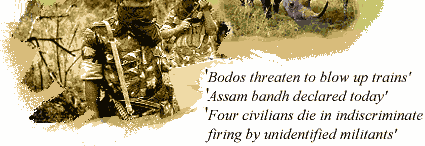
|
HOME |
NEWS |
REDIFF DIARY
|
Anita Bora |
|
I am kept up-to-date on developments in the North-East by a very concerned colleague. He makes sure that I get all the news with minimum time lag. I do appreciate his concern. But it is sad that there never seems to be any good news from my part of the country anymore -- or, maybe, the media just aren't highlighting it. While for the majority the North-East is an alien, unreachable and unfriendly region (some even have trouble recollecting the seven states), I have been lucky enough to visit all the seven sisters during my childhood.
Thanks to the political and social problems that have cropped up in the last 10 years or so, tourists do not frequent this region anymore. Only the very brave traveller ventures our side. Almost every state in the North-East today boasts of at least a handful of militant outfits fighting for separatism and autonomy. My father, a bank official posted in Shillong till recently, tells me that he used to visit Imphal, the capital of Manipur, with an army convoy, since it was extremely unsafe to travel unescorted. In the company of my father, I have travelled the interiors of these states. He simply loves driving, and used to go over alien roads and treacherous inclines in his car. We kept him company whenever possible, just to make sure that he did not fall asleep at the wheel. I wish I was a little more attentive on those journeys and had recorded everything. But I was just 12 or 13 then, and more interested in the shopping expeditions and invitations for lunch or dinner where we were headed for. My most vivid memories are of Shillong, the capital of Meghalaya. I spent most of my childhood there. Some 2,000 feet above sea level, this hilly city had the enviable reputation of being the Scotland of the East. During my school days, I considered Shillong the paradise on earth. No traffic, no pollution, very few people around. Everyone and everything was within walking distance. With the school just five minutes away, we could afford to rush out of the front door at the nth hour, just making it in time for the assembly.
I remember the wonderful view from our house. It had large French windows that whistled eerily when the strong March winds came in, keeping us awake all night. It was in the mid-80s that trouble began. The tribal population -- Khasis, Jaintias, Garos -- felt they were being outnumbered in the state. They began to protest and create problems for other communities. The Marwaris, Nepalis, Bengalis and Assamese communities were the worst affected. I knew something was wrong when, at the peak of the agitation, I witnessed a lorry driver being murdered on the road in front of my house. That unforgettable sight created a lasting impress on my mind. Things have not been the same since. Once a popular summer retreat, people began to look for safer alternatives to Shillong. And most Assamese and Bengalis began to shift base. Ten years later, I visited the town briefly. I can tell you one thing for sure -- Shillong will never be the same again. The level to which the North-East states have deteriorated is illustrated by the following incident. On the second day of my trip to Shillong, my father was called out on an emergency. A main branch in the middle of a busy area had been lootedł the guard shot in the stomach. The offenders, around 15 of them, had walked in, committed the crime and walked out in broad daylight. The next day, one of the Khasi groups admitted responsibility. They will probably never be caught. I was amazed at the blatant way it was committed. But my father was matter-of-fact. Such incidents, he told me, was commonplace. The state does not have enough resources to provide proper security for any bank. As a result, the working of banks in remote areas is affected. Officials operate in fear, not knowing what will happen and when. The streets are deserted by 1900 hours IST. The people I talked to (mostly from other states) were of the opinion that anti-social activities were basically committed by the largely illiterate youth. Most people continue in Shillong for business commitments. A Marwari businessman expressed his anguish thus: "We have been staying here for generations, doing business peacefully and living as law-abiding citizens. Suddenly, they want us out. Where can we go? This is our home, this is where we live." Today there are laws that prohibit people from other states to buy property here, except in certain select areas. Admission to schools and colleges is difficult, as the locals are given priority. And most of the school/college teachers not belonging to the state have been asked to leave their jobs. Check out the second part of this diary..
|
||
|
HOME |
NEWS |
CRICKET |
MONEY |
SPORTS |
MOVIES |
CHAT |
BROADBAND |
TRAVEL ASTROLOGY | NEWSLINKS | BOOK SHOP | MUSIC SHOP | GIFT SHOP | HOTEL BOOKINGS AIR/RAIL | WEDDING | ROMANCE | WEATHER | WOMEN | E-CARDS | EDUCATION HOMEPAGES | FREE MESSENGER | FREE EMAIL | CONTESTS | FEEDBACK |
||


 My memories are of rich and verdant fields, dense forests with exotic flora and fauna, and the most amazing scenic views. Whether it is Tripura or Mizoram, Nagaland or Manipur, Meghalaya or Assam, or the state at the farthest north-east tip of India, Arunachal Pradesh, the common factor is the intoxicating beauty.
My memories are of rich and verdant fields, dense forests with exotic flora and fauna, and the most amazing scenic views. Whether it is Tripura or Mizoram, Nagaland or Manipur, Meghalaya or Assam, or the state at the farthest north-east tip of India, Arunachal Pradesh, the common factor is the intoxicating beauty.
 Shillong is a small town. Because of its uneven terrain, most of the houses are perched on hilltops and inclines, making for interesting architecture and great views.
Shillong is a small town. Because of its uneven terrain, most of the houses are perched on hilltops and inclines, making for interesting architecture and great views.